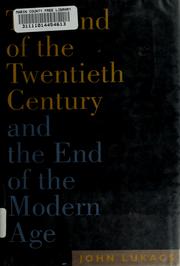Check nearby libraries
Buy this book

"Historian John Lukacs's brilliant new book offers a provocative summing-up of the twentieth century, that age of iron which began with the guns of August in 1914 and ended with the collapse of the Soviet Union in 1989. Distinguished by its author's masterly style and command of detail, The End of the Twentieth Century is a startling examination of where we are today, how we got here, and where we are headed." "Centering on Europe, America, and the relations between the two, Lukacs argues that the major battle of our time has been waged between forms of nationalism rather than between communism and democracy; that the great watershed events have been the two world wars, not the Russian Revolution; and that the century's radical revolutionary was neither Lenin nor Chairman Mao but Adolf Hitler. The book puts into sharp perspective such events as the collapse of the Soviet Union, the civil war raging in what was Yugoslavia, and the resurgence of right-wing politics in a reunited Germany. Rather than the end of history, we are now witnessing the end of the modern era, and what awaits us is not the triumphal reign of liberal democracy but a troubled time that may echo much that is most questionable in our age." "Informed by the precision and insight that have made Lukacs a leading historian, The End of the Twentieth Century is a reckoning both personal and professional - at once a brilliant rebuttal to Francis Fukuyama's The End of History and an outstanding, if sobering, work of historical mediation."--BOOK JACKET.
Check nearby libraries
Buy this book

Previews available in: English
| Edition | Availability |
|---|---|
|
1
Die Geschichte geht weiter: Das Ende des 20. Jahrhunderts und die Wiederkehr des Nationalismus
1996, Heyne Verlag
Paperback
in German
3453091418 9783453091412
|
zzzz
|
|
2
Die Geschichte geht weiter: das Ende des zwanzigsten Jahrhunderts und die Wiederkehr des Nationalismus
1994, List
in German
3471780572 9783471780572
|
zzzz
|
|
3
The end of the twentieth century and theend of the modern age
1993, Ticknor & Fields
in English
0395584728 9780395584729
|
zzzz
|
|
4
The end of the twentieth century and the end of the modern age
1993, Ticknor & Fields
in English
0395584728 9780395584729
|
aaaa
|
|
5
The end of the twentieth century and the end of the modern age
Publisher unknown
0395584728 9780395584729
|
zzzz
|
Book Details
Edition Notes
Includes bibliographical references.
Classifications
The Physical Object
ID Numbers
Source records
Scriblio MARC recordIthaca College Library MARC record
Internet Archive item record
Library of Congress MARC record
Better World Books record
marc_nuls MARC record
marc_columbia MARC record
Work Description
Historian John Lukacs's brilliant new book offers a provocative summing-up of the twentieth century, that age of iron which began with the guns of August in 1914 and ended with the collapse of the Soviet Union in 1989. Distinguished by its author's masterly style and command of detail, The End of the Twentieth Century is a startling examination of where we are today, how we got here, and where we are headed.
Centering on Europe, America, and the relations between the two, Lukacs argues that the major battle of our time has been waged between forms of nationalism rather than between communism and democracy; that the great watershed events have been the two world wars, not the Russian Revolution; and that the century's radical revolutionary was neither Lenin nor Chairman Mao but Adolf Hitler. The book puts into sharp perspective such events as the collapse of the Soviet Union, the civil war raging in what was Yugoslavia, and the resurgence of right-wing politics in a reunited Germany. Rather than the end of history, we are now witnessing the end of the modern era, and what awaits us is not the triumphal reign of liberal democracy but a troubled time that may echo much that is most questionable in our age.
Informed by the precision and insight that have made Lukacs a leading historian, The End of the Twentieth Century is a reckoning both personal and professional—at once a brilliant rebuttal to Francis Fukuyama's The End of History and an outstanding, if sobering, work of historical mediation.
Links outside Open Library
Community Reviews (0)
Feedback?| February 28, 2022 | Edited by ImportBot | import existing book |
| October 4, 2020 | Edited by Gustav-Landauer-Bibliothek Witten | details |
| October 4, 2020 | Edited by Gustav-Landauer-Bibliothek Witten | Merge works |
| February 14, 2020 | Edited by MARC Bot | remove fake subjects |
| December 8, 2009 | Created by ImportBot | add works page |














